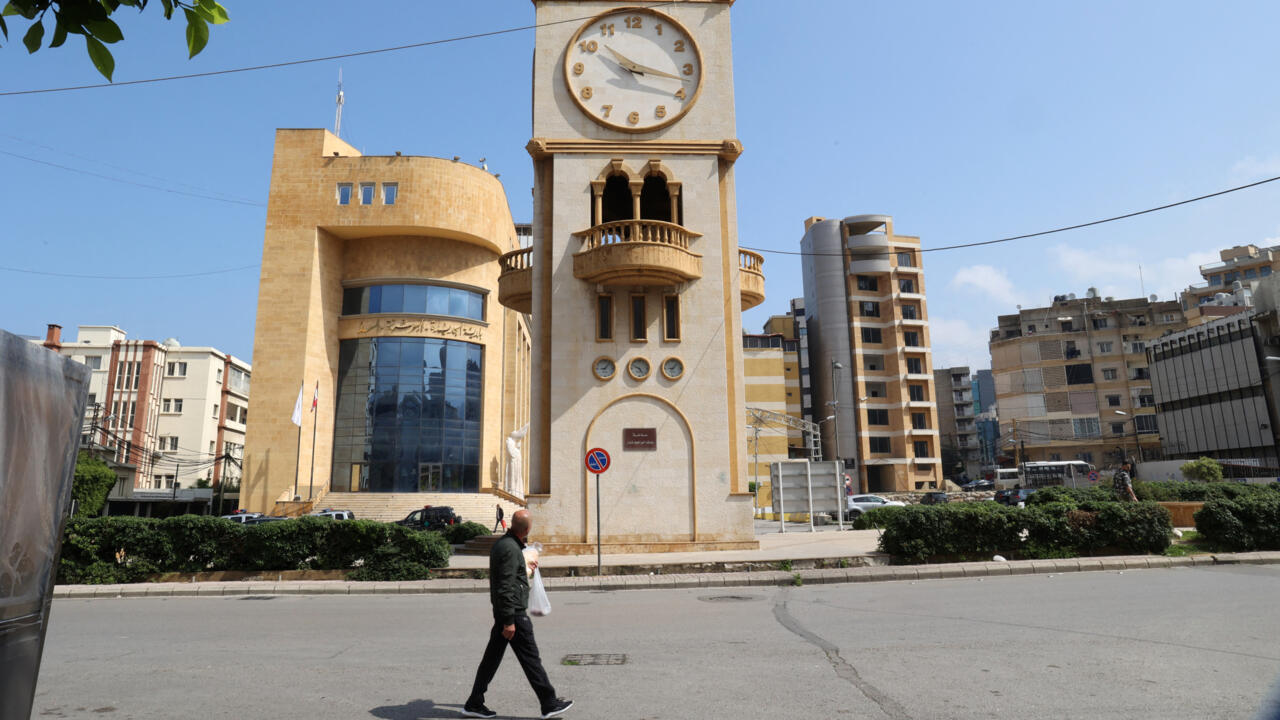Lighting
Lebanon: the change of the time zone turns into a sectarian dispute
A passerby observes the giant clock in Jdeideh, near downtown Beirut, March 26, 2023. © AFP/Anwar Amro
Text by: Paul Khalifeh Follow
5 min
Prime Minister Najib Mikati returned on Monday, March 27 to his decision, taken last Thursday, to postpone the transition to summer time by one month. The chaos that reigned in Lebanon for three days showed the extent of sectarian dissension, the fragility of political and social balances and the weakness of the State.
Advertising
Read more
From our correspondent in Beirut,
The case could have been burlesque if it had not taken on a community dimension and revived sectarian and sectarian reflexes in a country bruised for more than three years by an unprecedented multifaceted crisis.
The facts are simple: on Thursday, March 23, Prime Minister Najib Mikati announced in a press release the postponement by one month of the transition to summer time usually adopted on the last weekend of March. Nothing happens for 24 hours. Suddenly, on Saturday, March 25, a lively controversy broke out in the country after a video posted online shows the speaker of Parliament Nabih Berry, who is the main Shiite figure of the state, asking the head of government (Sunni), to extend the winter schedule (which sees the sun set an hour earlier) until the end of the month of Ramadan, in order to facilitate the fasting of Muslim populations.
Outcry from Christian circles
Christian political and religious circles are protesting against this decision "taken without consultation". The Maronite Church, several other Christian communities and Catholic schools say they would not conform to Mikati's measure. Three television channels and two daily newspapers close to Christian circles announce the transition to summer time on the night of Saturday to Sunday, as initially planned. A deputy of the Christian party of the Lebanese Forces, Razi el-Hage, filed an appeal for invalidation before the Council of State against the decision of the head of government.
The revolt extends to some ministers who publicly disavow Najib Mikati. Justice Minister Henry Khoury argues that the prime minister's decision is "illegal" because changing the time zone requires a decision by the Council of Ministers and cannot be done by a simple statement issued by the head of government.
Education Minister Abbas el-Halabi is calling on all schools to switch to daylight saving time, before reversing his decision and leaving the choice to school principals.
Meanwhile, passions are unleashed on social networks and exchanges sometimes take on a confessional dimension. Anecdotes abound and the Lebanese make a mockery of the decisions of their leaders.
The legendary humour of the Lebanese, however, does not hide the gravity of the situation. The country finds itself, as of Sunday, March 26, with two time zones. That of summer time is favored by Christians, that of winter time those of Muslims. On Monday, schools in Christian-majority areas open an hour later than schools in Muslim-dominated areas.
Thousands of families affected
On a technical level, Najib Mikati's measure has taken civil aviation, telecommunications companies, banks and other sectors by surprise that have not had time to adapt. The measurement of the postponement of the transition to daylight saving time was taken without synchronization with the time server through the so-called NTP, "Network Time Protocol".
On a practical level, Najib Mikati's hasty decision and the refusal of some quarters to comply affected thousands of families. "I teach at a Christian university that has decided to switch to daylight saving time and I work in a bank that has implemented the Prime Minister's measure. My schedules collide. I don't know what to do anymore," says Fadia, a mother in her forties.
"The case of the two time zones" shows the vulnerability of Lebanese society which is very quick to react to any event through the confessional prism. "This is typical of a society in crisis that loses its bearings and its critical sense and sinks into a logic of community withdrawal," says Adel Noun, a sociologist.
«
People no longer even realize that policymakers are deploying a diversionary strategy to steer them away from real problems and distract them with issues that actually don't matter to their future," he adds.
This affair has also shown the extreme weakness of a failed state where an administrative decision of the Prime Minister is no longer applied, not even some of his ministers.
Faced with the chaos that has begun to set in, Najib Mikati backtracked on Monday after a meeting of his government devoted exclusively to the issue of the time zone. "The Council has decided to maintain winter time for the time being and to switch to summer time overnight from Wednesday to Thursday. We need 48 hours to sort out some technical details," he said.
«
The decision (to postpone the transition to daylight saving time for one month) was taken to ensure a rest for people who fast during Ramadan, for one hour, without any intention of harming other Lebanese components, knowing that this decision has already been taken in the past," said Najib Mikati.
After the delirium of the last three days, the Lebanese are caught up in the harsh realities. Whether the time changes or not, the difficult conditions of daily life, the annihilation of purchasing power, the erosion of wages, the explosion of prices remain the same.
Newsletter Receive all the international news directly in your mailbox
I subscribe
Follow all the international news by downloading the RFI application
Read on on the same topics:
- Lebanon
- Religion
- Our selection
- Najib Mikati

